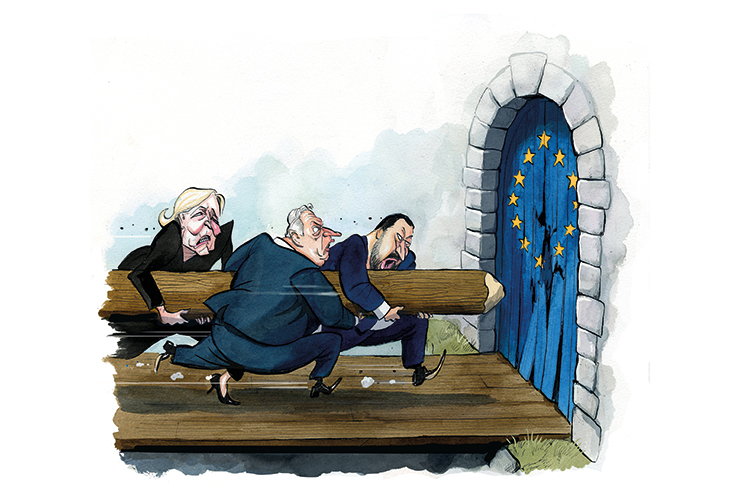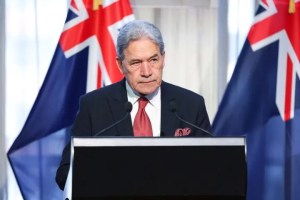There is a strange pre-revolutionary atmosphere in Brussels. At the various receptions and dinners before we broke up for Christmas, it felt a bit like the Last Supper. Elections to the European Parliament are usually predictable affairs, but this time Europhiles (like myself) fear it will be different. We have grown used to populists doing well in national elections over the years, from Sweden to Italy. But the European Parliament elections in May might lead to a landslide victory for Marine Le Pen’s National Rally, Italy’s League and other nationalist populist parties — and a victory may change the political face of the European Union.
In the past, it never really mattered much if the Euro election was carried by the left or the right: the result was the same anyway. The parliament has always been keeper of the federalist flame — much more so than the European Commission. In practice, elections only served the purpose of confirming the dominion of the overriding ideology in Brussels: that of ‘ever-closer union’. Yes, Euro elections would take in a haul of fist-shakers and heretics, and the odd political circus act. But whatever the question, the parliament’s answer had always been: ‘more Europe’.
Even two years ago, that mindset was still dominant. Emmanuel Macron had just beaten Le Pen in the French presidential election and promised to put new wind in the sails of mainstream politics. The West had reached ‘peak populism’. After the Brexit referendum and the election of Donald Trump — two massive defeats for -liberal orthodoxy — Macron was credited with breaking the neck of invading populists. It was safe for centrists to come out. Politics would become normal again.
But there wasn’t anything normal about Macron’s victory. In France, Macron is the insurgent who squashed the center-left and center-right. And within a year of his win, the Freedom Party had returned to government in Austria, and Viktor Orbán — the bête noire of Brussels — had been re-elected in Hungary with an even larger share of the vote. Milos Zeman, widely suspected to be a Kremlin stooge, had won another term as the President of the Czech Republic — after flirting with the idea of an in-or-out referendum on the country’s EU membership. His win came just a few months after the Czechs had elected the billionaire and self-styled populist Andrej Babis as its new Prime Minister. In Italy, the Five Star Movement and the League had taken charge of Italy’s government. And most remarkable of all, the far-right had yet again become an electoral force in German politics.
We can now see a coherence across Europe’s populists. And not because Steve Bannon or anyone else is building a nationalist populist movement across the continent. The populists do not specialize in working together, which in some ways is their whole point. But many of these parties have now been around for a while and matured, and speak for vast swaths of the population: a third of France, half of Hungary and most of Italy. They used shock tactics to get attention, but are changing as they wield power. As they have grown bigger — or been elected to govern — they have learnt the virtue of patience and the art of compromise.
So what began as a bunch of polemicists and rabble-rousers is now sprouting -networks of thinkers, journals and institutes. There is growing consistency in their policies, more discipline in the troops. They are nationalist and (mostly) xenophobic — but not exactly racist and fascist. They are Eurosceptic but (unlike the Tories) not against EU membership. They seek to break down the door, but not tear down the house. The distinction is crucial in understanding what is now under way.
Viktor Orbán in Hungary, Matteo Salvini in Italy, Jaroslaw Kaczynski in Poland and Alice Weidel in Germany: all of them want to reform, rather than leave, the EU. They think the EU has overreached, and they want power to be handed back from Brussels to the nation states. They have no collective agenda for Europe, and this is entirely their point: they dislike the idea of unanimity. Diversity, they say, is the hallmark of Europe and they want an EU which respects that. That message has power partly because the populists’ gains have made the center-left and the center-right start to question their own approach to Europe.
Take the Christian Democrats and their center-right group in the European Parliament, the European People’s Party (EPP) — which nominated Jean-Claude -Juncker as president of the European Commission. For decades, they have been the main -driver of European integration, but they now find themselves squeezed by nationalists. Germany’s center-right fear that the Alternative für Deutschland (AfD) will become bigger than Angela Merkel’s Christian Democratic Union in the May election. In France, the party of Charles de Gaulle and Nicolas Sarkozy has been cut down to size — almost marginalized — by the combination of a reformist Macron and an extreme right that is rehabilitating itself from its anti-Semitic and neo-Nazi past. In Italy, the center-right Forza Italia has been obliterated by Salvini and his League, which has — astonishingly — doubled its support in the polls since last year’s election. In the three main countries in the EU, support for the center-right has plummeted.
So this year’s Euro elections will leave the center-right without a confident or coherent voice. And it will look a bit lost when the main battle of ideas is between liberalism and nationalism. The center-right’s political strategy is defensive; its attitude is irritable. The various EPP parties aren’t winning many elections any more, so they boast about past gains. Last November, in the party’s primary election for choosing its candidate to lead the Commission, they could have sought to replace Juncker with Alexander Stubb. A former Finnish prime minister and Ironman athlete, Stubb is an energetic conservative and an unabashed supporter of a stronger EU. Instead they went for Manfred Weber, who is virtually unknown outside his home region of Bavaria. His main asset? Weber doesn’t seem to have strong views about anything.
The left isn’t doing any better. Across Europe, its parties will fight this year’s election with an electoral base that has been invaded by the nationalists and the populists. In many countries, social democracy is now in danger of dying out. When the center-left recently picked the polyglot Frans Timmermans, now Juncker’s deputy, to lead the party in the European Parliament election, critics joked that he hardly represented a member party. His Dutch social democrats lost more than 75 percent of their seats in the country’s 2017 election. Polls now suggest it won’t get more than two of the 29 Dutch seats in the European Parliament.
Just like the Labour party under Jeremy Corbyn, many social democratic parties are moving closer to the radical left. As a consequence, now that the center-left is no longer the mainstream and its parties do not necessarily represent the workers, it has become entangled in identity politics. In France’s presidential election, Le Pen had the strongest support among blue-collar voters. The venerable Parti Socialiste dropped from about 30 to 8 percent in the last ballot to the French assembly, and nowadays is little more than a lobby group for the post–modern left.
The supposed savior of the centrist Italian left, Matteo Renzi, was bulldozed by Beppe Grillo and the Five Star Movement in the last election. He’s still nursing an ambition to return to Palazzo Chigi, the home of the Italian prime minister, but since losing the election last spring has spent most of his time producing a television series about his native Florence. His party is polling below 20 percent.
So we have center-right parties spooked by migration and the borderless Europe. Meanwhile, the left is focusing its attentions on the single market, and would like to see scores of new policies introduced that restrict the freedom to do business across borders. For these parties, the ‘four freedoms’ are problematic. They worry about Polish plumbers fixing the pipes in France and Hungarian truck drivers delivering Amazon packages in Germany.
Without the introduction of new social rights, or taxes and regulations on labor that would ‘level the playing field’ between EU countries, the left threatens to disavow the principle of free trade inside the EU. So the supposed torch-bearers of ‘ever-closer union’ are losing faith in key foundations of the whole European project. Even they want a different Europe, with stronger borders, weaker rules, and more power for nation states.
This, ironically, is the change David Cameron asked for in his renegotiation. Europe was moving that way anyway, he said, so why not cut Britain some extra slack and help keep the EU together? He was refused, in part because it wasn’t just about Britain. The requests to abandon common rules were coming from all over the continent, and Brussels needed to hold firm. Confronted by populists demanding change in Europe, the EU wanted to see whether these movements might fizzle out as quickly as they flared up, leaving the grand project to continue.
Perhaps this explains some of the EU’s robustness in the Brexit talks. Paradoxically, Brussels’s rigidity is a sign of internal weakness — not of strength. Merkel and Macron, Donald Tusk and Michel Barnier fear not the country that leaves, but the members that stay. Even if no other country is looking for the exit, many want to have more flexible arrangements within the EU. For some, it is about allowing more subsidies for failing industries or bigger fiscal deficits; others want less demanding rules about cutting carbon emissions or about refugees seeking asylum. If the EU gives much ground, the result will be a disunited Europe.
And now, when the European Parliament could soon be controlled by confident nationalists, ambiguous conservatives and a radicalized social democracy, that possibility looks frighteningly likely. Any talk about ‘peak populism’ in 2017 turned out to be premature — but this might be the year of peak federalism. An era of never-closer union may be about to begin.
This article was originally published in The Spectator magazine.


















